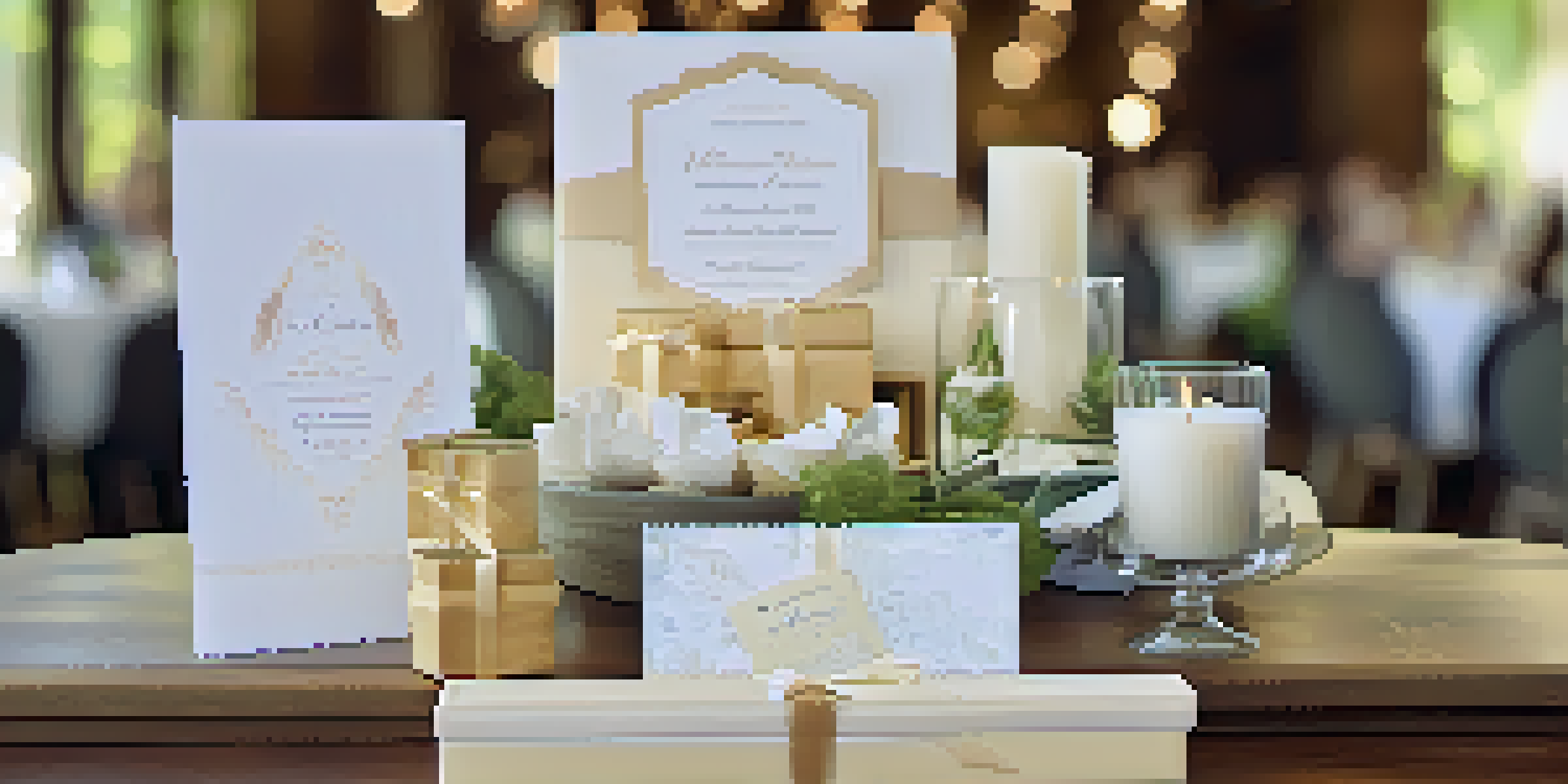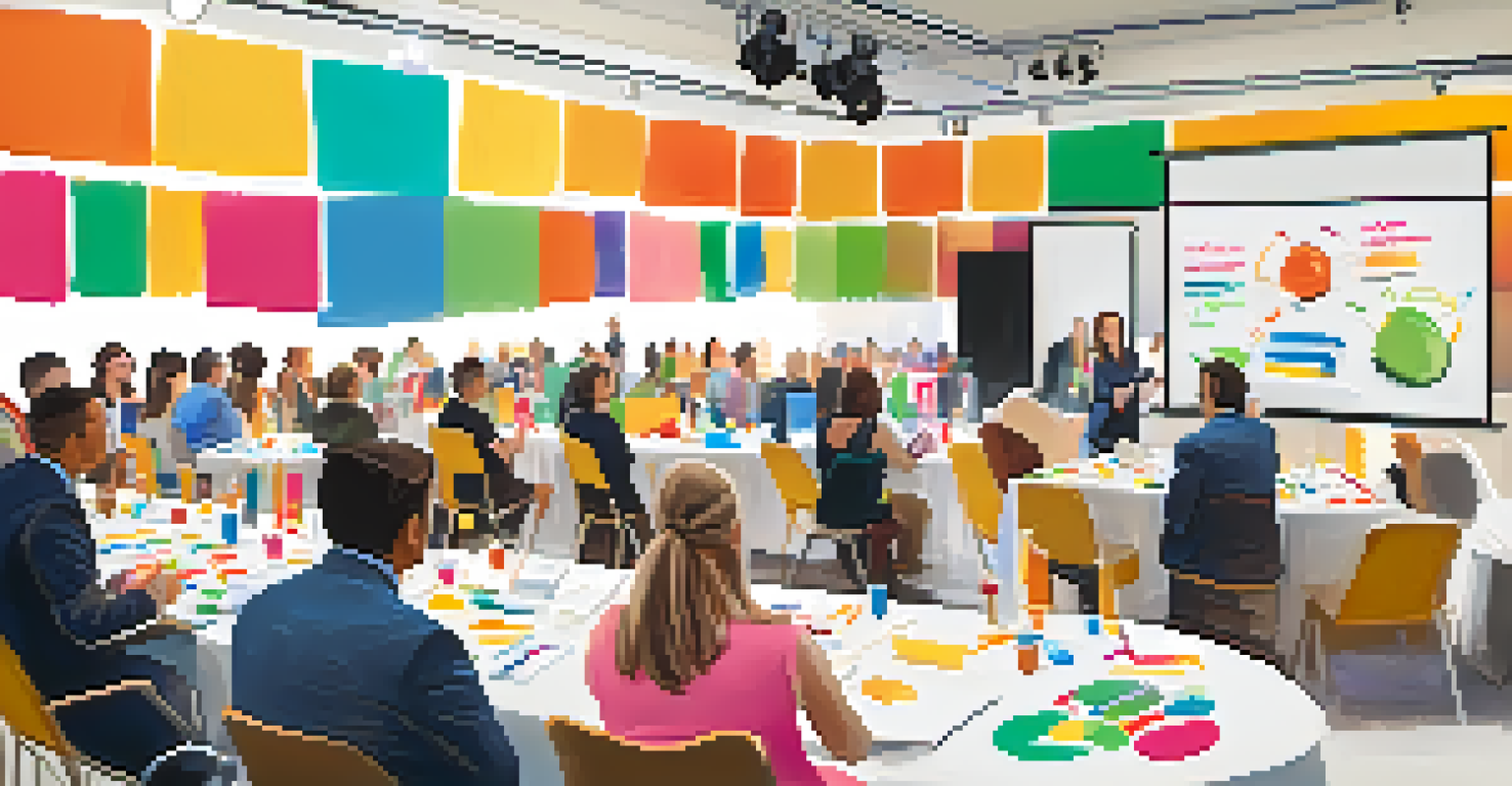Creating Custom Experiences: Personalization in Event Planning

Understanding the Importance of Personalization in Events
Personalization in event planning means tailoring experiences to meet the unique needs and preferences of your attendees. This approach enhances engagement and satisfaction, creating memorable experiences that resonate with guests long after the event. By understanding what your audience values, you can craft an event that feels special and relevant to them.
People don’t care how much you know until they know how much you care.
Think about how a personalized touch, such as customized invitations or tailored activities, can make guests feel valued. For instance, a wedding planner might create a unique theme based on the couple's shared interests, which can leave a lasting impression on all attendees. In a corporate setting, understanding participants' professional backgrounds allows you to curate sessions that truly resonate with their goals and challenges.
Ultimately, the goal is to create an emotional connection that fosters loyalty and encourages word-of-mouth referrals. When guests feel a genuine connection to the event, they are more likely to share their experiences with others, amplifying your event's reach and impact.
Gathering Insights: How to Know Your Audience
To create personalized experiences, you need to gather insights about your audience. Surveys, social media polls, and pre-event questionnaires are excellent tools for understanding attendee preferences and expectations. This information forms the backbone of your event planning process, helping you make informed decisions that enhance guest experiences.

For example, if you discover that most attendees prefer interactive workshops over traditional presentations, you can adjust your agenda accordingly. This shift not only meets their preferences but also encourages participation and enthusiasm throughout the event. Knowing your audience also helps in selecting the right speakers or entertainers that resonate with their interests.
Personalization Enhances Engagement
Tailoring event experiences to individual preferences significantly boosts attendee satisfaction and creates lasting memories.
Incorporating this audience data into your planning ensures that you aren’t just guessing what attendees want, but rather crafting a program that aligns with their desires. The better you understand your audience, the more effectively you can personalize their experience, leading to increased satisfaction and engagement.
Designing Customized Event Themes and Formats
Once you have a clear understanding of your audience, the next step is designing a theme that reflects their interests and preferences. A well-chosen theme can tie all elements of the event together, creating a cohesive and immersive experience. Whether it's a corporate retreat with a focus on innovation or a birthday party centered around a favorite movie, themes set the tone for the entire event.
The best marketing doesn’t feel like marketing.
Consider incorporating elements that resonate with your audience, such as color schemes, decorations, and entertainment that reflect their tastes. For instance, a tech-savvy audience may appreciate a futuristic theme with interactive tech displays, while a more traditional crowd might prefer classic elegance. Tailoring the format of the event, such as choosing between a sit-down dinner or a casual mix-and-mingle, can also enhance the overall experience.
Ultimately, a customized theme and format not only engage your guests but also make them feel more connected to the event. This thoughtful approach demonstrates that you've considered their preferences, which can create a positive atmosphere and encourage participation.
Leveraging Technology for Personalization
In today's digital age, technology plays a pivotal role in personalizing event experiences. Tools like event management software can help you collect and analyze attendee data, allowing for tailored communications and experiences. From customized agendas to personalized reminders, technology can streamline the process of making each attendee feel special.
For example, using mobile apps for your event can allow guests to choose their sessions, network with fellow attendees, and even receive personalized content based on their interests. With features like push notifications, you can remind guests of events that align with their preferences, ensuring they never miss an opportunity to engage. This level of customization can significantly enhance their experience at your event.
Understanding Your Audience Matters
Gathering insights through surveys and feedback is essential for crafting personalized events that truly resonate with attendees.
Moreover, technology can facilitate real-time feedback, enabling you to adjust elements of the event on the fly. If attendees express a desire for more interactive sessions during the event, you can adapt accordingly, creating a responsive and dynamic environment that prioritizes guest satisfaction.
Creating Memorable Touchpoints Throughout the Event
Touchpoints are critical moments during an event where you can create lasting impressions on your guests. These can include welcome packages, personalized seating arrangements, or even interactive stations that reflect guest interests. By thoughtfully designing these moments, you can enhance the overall experience and foster a sense of belonging among attendees.
For instance, consider a welcome package that includes personalized notes or gifts tailored to individual guests' preferences. This simple gesture can make attendees feel appreciated and valued right from the start. Similarly, creating interactive experiences, like photo booths with customized backdrops, can encourage guests to engage and share their experiences on social media.
Memorable touchpoints not only enhance the event experience but also encourage attendees to share their positive experiences with others. When guests feel special and recognized, they are more likely to talk about the event long after it ends, driving interest for future events.
Following Up: Personalization Beyond the Event
Personalization shouldn't end once the event is over; in fact, it can be the key to maintaining relationships with your attendees. Following up with personalized messages, thanking guests for their participation and sharing highlights from the event can keep the conversation going. This approach not only shows appreciation but also keeps your event fresh in their minds.
You can also gather feedback through surveys to understand attendees' experiences better and identify areas for improvement. Tailoring follow-up communications based on the feedback received can help build a more robust relationship and demonstrate that you value their input. For example, if a guest particularly enjoyed a specific session, consider sending them additional resources related to that topic.
Technology Streamlines Personalization
Leveraging digital tools can facilitate customized experiences and real-time adjustments, enhancing overall attendee engagement.
By maintaining this connection, you nurture a community around your events, making attendees feel valued and heard. This ongoing relationship can lead to increased loyalty and attendance at future events, as guests feel more connected to your brand and mission.
Measuring Success: Analyzing Personalized Experiences
After your event, it’s important to analyze the effectiveness of your personalization efforts. Collecting data on attendee engagement, feedback, and overall satisfaction can help you understand what worked and what didn't. This analysis is crucial for continuously improving your event planning process and ensuring future events resonate with your audience.
You can utilize tools like post-event surveys, social media analytics, and attendance rates to gather insights. For instance, if you notice that certain sessions had higher attendance or engagement levels, it may indicate that those elements were particularly appealing to guests. Conversely, low engagement in other areas may highlight a need for adjustments in future planning.

Ultimately, measuring the success of personalized experiences allows you to refine your approach and create even more impactful events in the future. By continuously evolving your strategies based on data and feedback, you can build a reputation for delivering exceptional, tailored experiences that keep guests coming back for more.